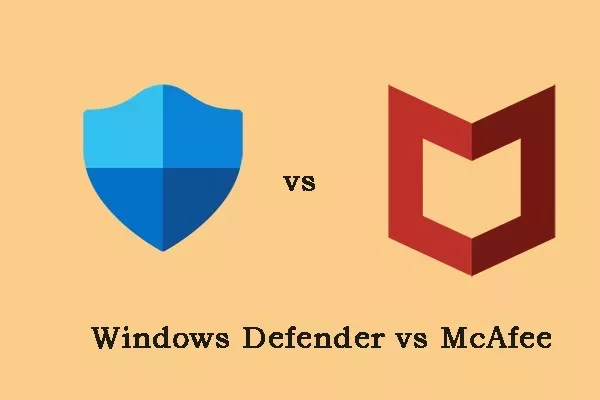
Every so often, news of major data breaches, such as the infamous Equifax data breach, makes headlines. In fact, almost two out of three Americans have suffered a data breach, including hacked social media accounts, leaked data, and stolen credit cards, according to Pew Research.
An increasing number of Americans are worried about their safety on the internet. One of the best ways to safeguard yourself is to use antivirus technology, but which is the best and most effective antivirus solution?
That can be a difficult decision to make, as there are many options available. To help you get the best security for your computer, let’s take a look at two of the most popular antivirus solutions: McAfee vs. Windows Defender.
Windows Defender, now renamed as Microsoft Defender Antivirus, is installed by default on all versions of Windows. Back in the day, it wasn’t so good, but it has gotten significantly better.
However, is it enough for your PC, or should you install an additional third-party antivirus? Let’s go into a bit more depth and compare these programs side by side.
Comparing McAfee and Windows Defender
When comparing Windows Defender vs. McAfee at an initial glance, we can see they received the same ratings from AV-Test, a site that rates antivirus software in terms of usability, performance, and protection. Both software programs achieved a 6 out of 6 for the usability, performance, and protection categories.
One thing worth noting, though, is that McAfee experienced a higher rate of false positives. In other words, it blocked legitimate apps and identified legitimate software as malware when, in fact, the software was clean.
While the false positive rate was still below the industry average (false positives are difficult to avoid altogether), these false positives from McAfee can give people false cause for concern.
So, is Windows Defender better than McAfee? No, but it’s also not worse. There are some things that Windows Defender Antivirus doesn’t have that McAfee does.
At the same time, Windows Defender is free and comes on your PC by default, while McAfee must be purchased and downloaded. So, is McAfee worth it? Continue reading for the answer.
Do Windows Defender and McAfee Provide the Same Protection?
Pretty much. In fact, most people don’t need McAfee if you have Windows Defender.
Windows Defender is the built-in antivirus and security solution on Windows. It provides decent protection against viruses, malware, spyware, and phishing attacks. It’s come a long way and is enough for most people. MS Defender also has excellent malware detection capabilities, so if you run a scan, it will pick up almost all viruses and malware on your device at a similar rate as McAfee.
However, when comparing Microsoft Defender vs. McAfee, we do have to note a few things. First of all, one of the most considerable differences between Windows Defender vs. McAfee is web browsing protection. MS Windows Defender only provides real-time browsing protection if you are using Microsoft Edge.
If you are using Chrome or Firefox, you won’t be protected from malicious websites. Therefore, if you want real-time protection while browsing on a third-party browser, it would be beneficial to look for a third-party antivirus solution such as McAfee.
Can McAfee and Windows Defender Be Used Together?
In general, it is not recommended to run both McAfee and Windows Defender together on the same computer. When two antivirus programs are running at the same time, they can conflict with each other and cause system instability and reduced performance, since they both consume RAM.
However, that’s only really true if you turn on real-time protection for both. If you turn off real-time protection for one antivirus, it won’t conflict with the other as long as you don’t run scans at the same time. In that case, you don’t need to disable Microsoft Defender, even if you have McAfee.
In fact, you can have both of these programs and run scans at different times, such as one after the other. This will give you enhanced security, but only slightly. There is a slight chance McAfee Antivirus will pick up malware which Microsoft Defender missed and vice versa.
In short, antivirus coexistence is possible, as long as you ensure software compatibility by not running scans at the same time and not turning on real-time protection on both programs.
Should I Uninstall McAfee If I Have Windows Defender?
In general, there’s no need for McAfee if you have Microsoft Defender. Both offer performance optimization and AI-driven threat detection, for example.
Although Microsoft Defender doesn’t provide cloud-based security for Chrome and Firefox, these browsers will typically warn you about malicious sites anyway. You can also visit the McAfee security center for resources on safe browsing habits.
However, if you do have McAfee, you don’t have to uninstall it, as long as you don’t have real-time protection activated on both programs. McAfee does have a few advantages, such as offering a built-in password manager, which is why you might want to keep it.
Does McAfee Provide Effective Protection?
Yes. When comparing Windows Security vs. McAfee, you will see that McAfee’s malware protection is top-notch.
It uses advanced security technologies and behavioral analysis to scan for and block viruses, malware, spyware, ransomware, zero-day attacks, and other harmful attacks. It provides privacy protection tools and also blocks phishing attacks. McAfee provides real-time protection against advanced persistent threats with the power of AI and machine learning.
With McAfee LiveSafe, your personal devices are monitored 24/7 for the latest online threats. Additionally, McAfee provides you with advanced internet security tools such as firewall protection and password management to help keep your data safe from unauthorized access.
The Adequacy of Windows Defender as a Security Solution
Any legitimate Microsoft Defender antivirus review will conclude that it’s adequate as a main antivirus protection. It offers powerful features that can protect against malicious software and networks and provides a good selection of features to keep your device secure.
Windows Defender also regularly checks for new virus definitions and updates itself automatically, so you don’t have to worry about manually updating the software. It also offers real-time protection against malware, ransomware, spyware, and other types of malicious threats.
In short, Windows Defender is good enough for most people, especially if you use Edge. However, one shortcoming of Windows Defender Antivirus is that scheduling scans, while possible through the Task Scheduler on Windows, is a bit unintuitive for many people. McAfee, on the other hand, makes it easy.
The Impact of McAfee on Computer Performance
Is McAfee necessary if you have Microsoft Defender? No, not really. Not only that, but it can affect the speed of your computer, as it’s more resource-intensive than Microsoft Defender.
The scanning process and real-time protection can slow down certain applications, particularly on older computers with fewer hardware resources.
So, if you’re asking yourself, “Do I need McAfee?” the answer is no. While optimization techniques exist to reduce McAfee’s performance impact, such as using lightweight scanning instead of deep scans and making other adaptive performance adjustments, McAfee isn’t really necessary in the first place. You will be just fine with Microsoft Defender.
Is Windows Defender Sufficient for Protecting My Computer?
Yes. Windows Defender security is a good basic virus protection software.
Microsoft Internet Security is capable of detecting many threats and can provide a reasonable level of security on its own.
Third-party antivirus software may be able to detect more threats and may offer additional features such as password management or parental controls, but Windows Security will catch almost all malware.
Is Windows Defender free? Yes, it is. So, not only is it enough for most end users, but it won’t cost you any money.
Conclusion
In conclusion, Windows Defender provides just as good antivirus protection than McAfee and is free, making it the superior choice for Windows users. Windows Defender has earned great ratings in usability and malware protection tests, and it has been proven to help protect against emerging online threats and cybersecurity challenges.
Additionally, it uses fewer resources than McAfee, which makes it a more cost-efficient option. It also has fewer false positives and is entirely free to use.
Ultimately, while both options provide antivirus protection, Windows Defender is the better choice for those seeking security without taking a toll on their device’s performance. Thus, Microsoft Defender emerges the winner in our McAfee vs. Windows Defender comparison.









I appreciate the clear and concise way you’ve presented the information. This was very helpful!
Sure thing! Thanks for the kind words this motivates us to keep pushing forward.
This article is a perfect example of your ability to communicate complex ideas simply. Well done!
Thanks alot, your kind words are much appreciated!